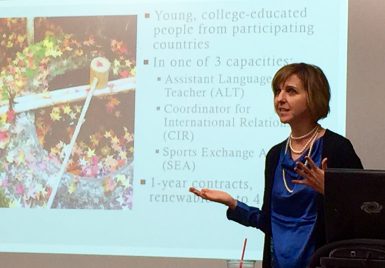Metzgar talks on exchange program’s effects on diplomacy

Associate professor Emily Metzgar kicked off the semester’s first research talk Sept. 4 with a presentation about public diplomacy and international exchange programs.
“Theorizing Public Diplomacy: The JET Program as a Case Study” featured former and current research methods Metzgar employed to contextualize public diplomacy within the Japan Exchange and Teaching Program.
Metzgar conducted her research around the centralized question of the program’s effectiveness in facilitating mutual relationships between Japanese and American alumni.
“There is no single theory of public diplomacy,” Metzgar told the group gathered in Radio Television 226. “It makes for a terribly fuzzy research process that doesn’t pass academic muster.”
JET was established in the early 1980s, Metzgar said, and since then has generated 30,000 American alumni. She surveyed more than 500, asking the duration of their stay in Japan, where they were stationed and, most important, their assessment of the program.
She found that 85 percent of JET alumni had a favorable view of Japan, compared to 65 percent of the general American population.
In an exchange program like JET, the host country aims for like young, college-educated people to have a positive experience during their stay, and then serve as opinion leaders when they return to their home country. While in their host countries, participants teach their language in schools or in government offices. Metzgar defined this phenomenon as “soft power” exchange, a term first used by public diplomacy researcher Joseph Nye of Harvard.
“The key is the influence that public opinion has on foreign policy,” she said.
Metzgar has a unique view as she herself is an alumna of JET. When she participated in the program, she did not think of the influence her experience would have over her opinion of Japan.
“As a participant, I saw it only as an education program, where if the students I was teaching did not learn, I was failing,” Metzgar said. “But to them (Japan), I was succeeding by just being there.”
By the measures taken in her survey research, Metzgar concluded that JET’s success as an international exchange program seems clear.
In the future, Metzgar said there is a possibility of conducting further case studies of international exchange programs to better understand and perhaps generalize the influences programs similar to JET have over public diplomacy.
The next research talk is the first Third Half discussion of the semester at 12:30 p.m. Sept. 11 in Radio Television 226.

